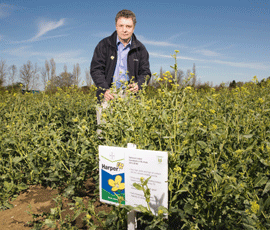Bayer aims for the top of the hybrid OSR tree

Bayer CropScience aims to use its global muscle to become one of the top three oilseed rapeseed suppliers in the UK within five years as it ramps up investment in seeds.
The ag-chem giant will focus on pushing yields of hybrid varieties up, as it eyes the UK market with its already wide portfolio.
Bayer’s seed business has seen a double-digit growth rate over the past 10 years globally, with breeding centres established in North America, India, Singapore and Europe.
The company now re-invests 30% of its turnover back into research and development of seeds, which it will increase to 50% by 2015.
UK seeds business manager Adrian Cottey believes Bayer is in a great position to move forward.
“We will start with varieties that do the job, creating a sound base to then bring in specific non-GM traits that will result in higher performing hybrids for UK growers.”
A large genetic pool to utilise is a crucial starting point and Bayer lead rape breeder Dirk Decherf believes they have enough diversity.
“We are working on herbicide and disease resistance, grain and oil yield, stability (pod shatter and lodging resistance), and specific oil varieties such as high oleic, low linoleic (HOLL),” he explains.
Bayer first entered rape varieties into national list trials in 2008/09 and commercial winter rape varieties include Harper and Patron. The firm also has four hybrid spring rape listed, with a further four in national list trials.
Hybrid winter variety Harper is now in HGCA Recommended List trials and has a good disease resistance profile, including score of 8 on phoma stem canker – a trait common to Bayer hybrids.
Narrowly missing out on the 2013/14 Recommended List was conventional variety Patron, which is sold exclusively through distributor Frontier.
“It is suited to East Anglia and the south, is short and stiff straw and an oil content of 46.6%, which can provide a healthy bonus,” says Carol Norris, seed development manager in the UK.
Although Harper is being trialled in the East/West region, Ms Norris believes it will be suited to the North also and around 5-6,000ha should be available for 2013 plantings.
Grower support will be a key part Bayer’s strategy in the UK, offering advice on variety suitability and how best to manage the crops from seed to harvest.
“Communicating information from both trial and commercial conditions, with a heavy regional emphasis, will enable growers to maximise the potential of these varieties in the field,” concludes Mr Cottey.
Bayer expands seeds division into Europe

